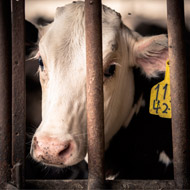
Data details instances of chickens being boiled alive
There have been over 4,000 breaches of animal welfare regulations in the past two years, according to data released by the Food Standards Agency.
The data, which comprises reports by vets and hygiene inspectors, details instances of chickens being boiled alive and trucks of animals freezing to death.
The log of reports, released to the Bureau of Investigative Journalism, show how regular breakdowns on production lines, equipment failures and poor procedures in abattoirs led to the suffering of thousands of animals each year.
Furthermore, the records reveal that many animals presented to slaughter are in appalling condition. While some were emaciated or too weak to stand, others were diseased or suffering from open wounds and fractures.
Hygiene inspectors and vets working for the FSA inside abattoirs reported over 9,500 animal welfare breaches between July 2014 and June this year.
The Bureau's analysis revealed that many of these breaches were 'category 4' incidents, meaning the animals were subjected to "avoidable pain, distress or suffering". A single breach can involve hundreds of animals, they write.
Responding to the findings, Neil Parish, conservative MP and farmer, called for the government to crack down on cruelty at abattoirs.
“There is no place for animal cruelty at any stage of farm production – including the slaughterhouse,” he said. “This country prides itself on having some of the highest animal welfare standards in the world. It’s vital the authorities crack down on any abuses and ensure there is zero tolerance to any mistreatment of animals when slaughtered.”
As part of their investigation, the Bureau also reviewed data going back to April 2011 and revealed over 16,000 breaches of welfare regulation - 6,241 of which were category 4.
The data included a cow being "violently slammed" against a wall, and a haulier hitting and kicking cattle during unloading.
Moreover, there were thousands of instances of animals not being stunned or killed properly. In some cases, they were not stunned at all, and in others regaining consciousness afterwards.
A spokesperson for the FSA, who are responsible for monitoring welfare inside slaughterhouses, said it had a "zero tolerance" attitude to welfare breaches and used a "proportionate approach" to enforcement. Action could include withdrawing or suspend certificates of competence from slaughter, referring cases for prosecution, stopping operations or serving welfare enforcement notices.
“There is a comprehensive animal verification procedure in place at every slaughterhouse for monitoring animal welfare,” it said in a statement. “4 scores (meaning level 4 breaches) can be the result of unavoidable accidents rather than deliberate abuse.”
They added that the welfare reports concerned only a tiny percentage of animals going through slaughterhouses. But Marc Cooper, head of farm animals at the RSPCA, said the fact that serious welfare breaches were the exception not the norm was not the point.
“Such incidences of severe pain, distress and suffering are wholly unacceptable and completely avoidable,” he said. “If they’re avoidable, that means they shouldn’t be happening at all – you shouldn’t be seeing one. You would hope that strong enforcement action would be taken.”



 The latest
The latest